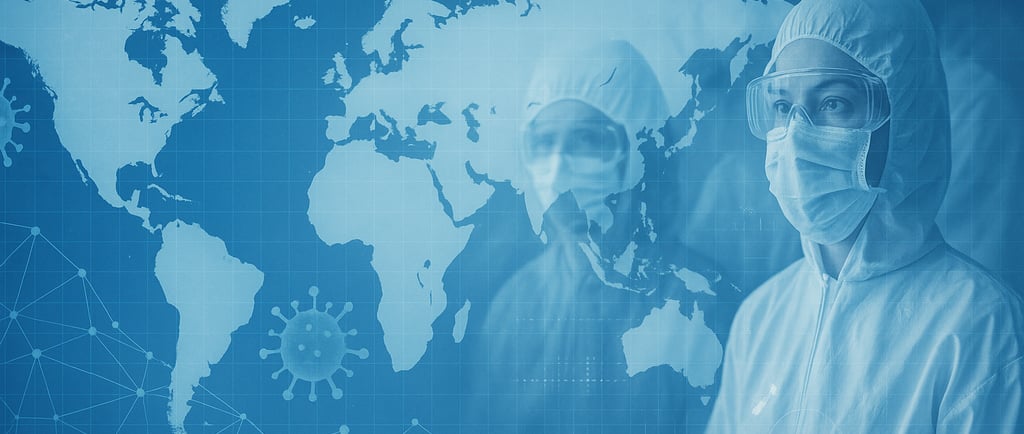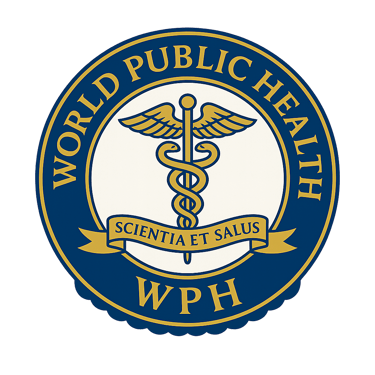The Future of Global Health Security: Lessons from Pandemics
By David Adeyemo World Public Health
10/15/20253 min read


Introduction
The twenty-first century has been defined by a series of infectious disease outbreaks that reshaped global health systems. From SARS in 2003 to COVID-19 in 2020, each crisis revealed the strengths and weaknesses of international preparedness and response. These events did more than disrupt economies; they exposed deep structural inequalities and vulnerabilities in public health systems. As the world reflects on these lessons, the path forward must center on collaboration, innovation, and sustained investment in health security.
Global Preparedness and Systemic Gaps
The COVID-19 pandemic demonstrated how fragile health infrastructures can be, even in high-income nations. Despite decades of warnings from epidemiologists and public health experts, few countries maintained adequate stockpiles, laboratory capacity, or trained personnel to manage large-scale outbreaks. The World Health Organization (WHO) established the International Health Regulations (IHR) to help countries build core capacities for surveillance and response, yet compliance remains uneven. In many regions, underfunded health systems and fragmented governance structures delayed early detection and reporting of new threats.
The experience of West Africa during the 2014–2016 Ebola epidemic showed how delayed response amplifies mortality and economic loss. Similar lessons emerged from COVID-19, where inconsistent testing and communication led to widespread misinformation and loss of public trust. Effective preparedness, therefore, is not merely a technical function but a governance priority that requires sustained political will.
The Role of Data and Technology
Digital innovation now plays a central role in disease surveillance and response. Artificial intelligence, geographic information systems, and mobile-based reporting tools are transforming how outbreaks are monitored. Platforms such as WHO’s Epidemic Intelligence from Open Sources (EIOS) and the Global Outbreak Alert and Response Network (GOARN) allow for rapid identification of anomalies. However, technology alone cannot replace transparent reporting, ethical data sharing, and trust between nations.
The next generation of global health security will rely on integrated digital ecosystems that combine traditional epidemiology with real-time analytics. This approach can help anticipate outbreaks before they escalate, enabling targeted interventions and resource allocation.
Building Resilient Health Systems
Preparedness cannot exist without resilience. A resilient health system is one that continues to deliver essential services during emergencies. Investments in workforce training, supply chain management, and community engagement are crucial. The WHO’s Health Emergency Preparedness, Response, and Resilience (HEPR) framework emphasizes an all-hazards approach, integrating disease surveillance with emergency management and primary healthcare.
Countries that maintained universal health coverage and strong primary care systems, such as South Korea and New Zealand, demonstrated better outcomes during COVID-19. These examples highlight that strong governance, trust, and community participation are as vital as advanced medical technologies.
Equity and Global Solidarity
Health security is inseparable from health equity. During the pandemic, access to vaccines and diagnostics was highly unequal. High-income countries secured the majority of early vaccine doses, leaving low-income regions vulnerable. The COVAX initiative, launched by WHO and partners, sought to correct this imbalance, but logistical challenges persisted. True global health security demands that every country, regardless of income, has the means to prevent, detect, and respond to health threats.
Future preparedness must prioritize fair distribution of resources, local manufacturing capacity, and global financing mechanisms that reach the most vulnerable populations. The global community must shift from reactive charity to proactive solidarity.
The Path Forward
The future of health security depends on three principles: collaboration, transparency, and sustainability.
Collaboration: Governments, NGOs, and academic institutions must coordinate across borders and sectors.
Transparency: Open data sharing and honest communication are essential for early action.
Sustainability: Investments must focus on long-term capacity rather than short-term crisis response.
Global health is a shared responsibility. No country can stand alone against pandemics that recognize no borders. Strengthening global health security is not only a matter of survival but a moral obligation to future generations.
Conclusion
Pandemics will continue to test humanity’s collective resilience. The lessons of past outbreaks make one truth clear: preparedness is not optional. It is the foundation of public health and the cornerstone of a safer world. As organizations like WHO, CDC, and World Public Health continue to champion global health equity, the future will depend on our ability to transform lessons into lasting systems that protect every community, everywhere.


About the Author:
David Adeyemo, RN, MSN, MPA, MS-HRM, CPH, PhD(c), is the Founder and President of World Public Health. He is a public health nurse, Army medical officer, and global health scholar dedicated to advancing public health leadership and equity worldwide.
